Yesan Sudeoksa Gwaebul and Wooden Lotus Pedestal from Goryeo dynasty visits Seoul
연합뉴스 / 2022-04-12 11:25:00
SEOUL, Apr. 12 (Yonhap) -- Along with the 17th-century hanging scroll featuring Rocana Buddha, also known as "Gwaebul" which was made in the Joseon Dynasty and is currently owned by the Sudeoksa Temple, Yesan, South Chungcheong Province, the "Mokjoyeonhwadwaeja" or the wooden lotus pedestal from the Goryeo Dynasty will be exhibited on The National Museum of Korea in celebration of the Buddha's Birthday in May. Both of these relics are South Korea's designated treasures.
Yesan Sudeoksa Gwaebul and Wooden Lotus Pedestal from Goryeo dynasty visits Seoul
SEOUL, Apr. 12 (Yonhap) -- Along with the 17th-century hanging scroll featuring Rocana Buddha, also known as "Gwaebul" which was made in the Joseon Dynasty and is currently owned by the Su
k-odyssey.com
National Museum of Korea
Press Release
National Museum to Display Huge Gwaebul Scroll ‘Feast of Light’ for Buddha’s Birthday
The National Museum of Korea will open an exhibit of a splendid 17th-century hanging scroll featuring Rocana Buddha, from the historic Sudeoksa Temple, on April 13, in celebration of the Buddha’s Birthday in May.

The exhibit will also introduce a wooden lotus pedestal from the temple’s main hall, made in the 14th century during the Goryeo Dynasty, and replicas of a mural in the same hall. The pedestal has never been displayed outside the temple before.
The exhibition, entitled “Feast of Light,” will continue beyond Buddha’s Birthday, on May 8 this year, until October 16 at the gallery of Buddhist paintings on the second floor of the museum.
It will be a rare occasion of appreciating a Buddhist scroll painting of an overwhelming scale from the Joseon period alongside an exquisite craftwork from the Goryeo period.
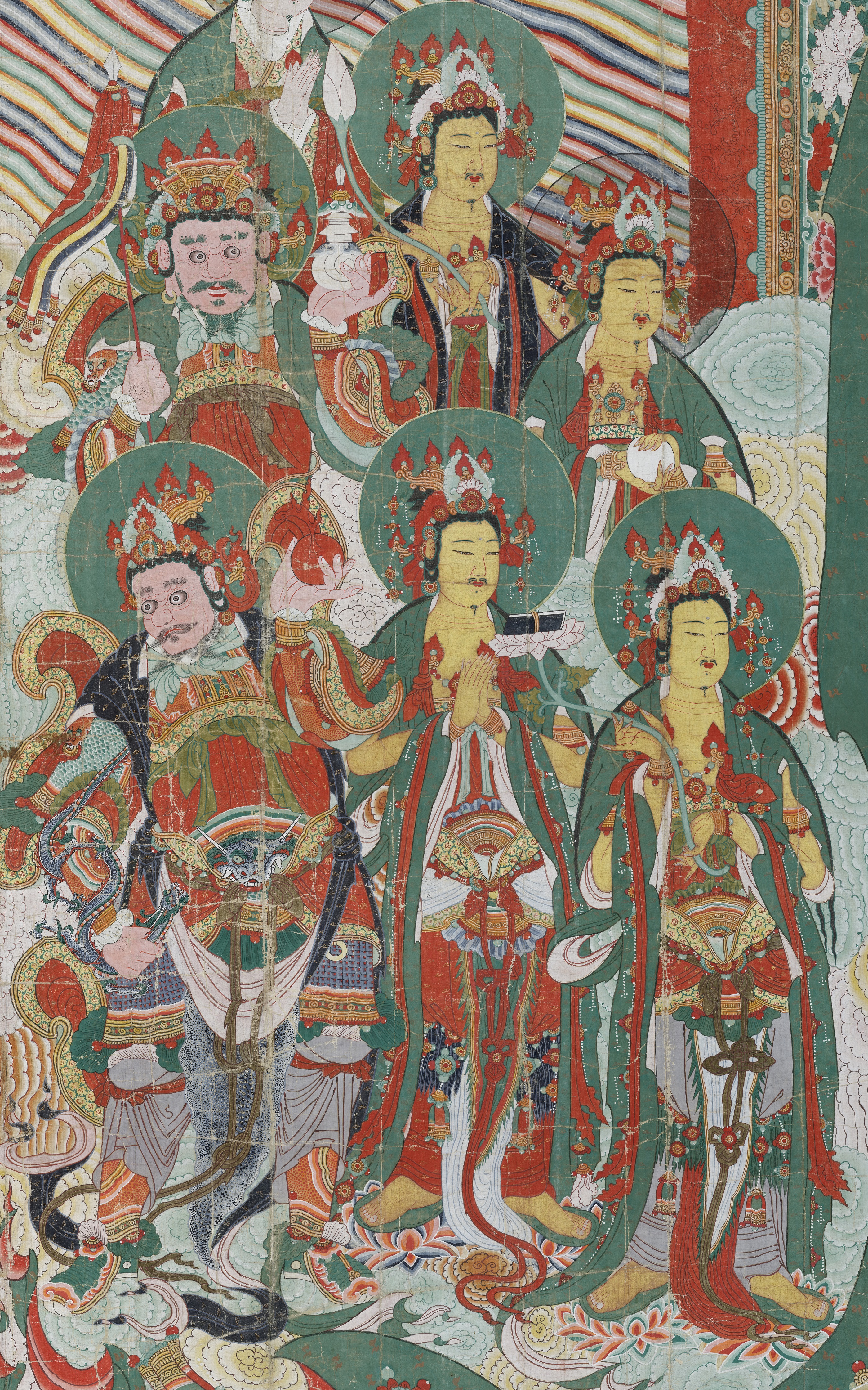
The Scroll
In the vast pantheon of Buddhism, the Rocana Buddha is one of the “three bodies” of the Buddha. Known as the Blissful Body of the Buddha, Rocana symbolizes immeasurable peace, merits and happiness rewarded for spiritual practice and benevolent behavior through countless ages.
Huge scroll paintings of Buddhist deities for massive outdoor assemblies defy the widespread notion of Buddhism of the Joseon Dynasty as a faith for stoic spiritual practice and abstinence, persecuted by Confucian-oriented rulers.
They typically depict a plethora of divine figures gathered around the principal Buddha in a colorful, stylized fashion.

The hanging scroll going on display is characterized by radiation of light emanating in colorful waves from Rocana Buddha at the center. The gigantic Buddha image, wearing a gorgeous crown and robe of floral design adorned with colorful jewelry and beads, is surrounded by many bodhisattvas and disciples. [Plates 1-4]
Called gwaebul, the hanging scroll is some 10 meters high, 7.4 meters wide, and weighs over 150 kilograms. It was painted by monk artists in 1673, during the Joseon Dynasty, and has been used at large-scale outdoor sermons and ceremonies at Sudeoksa Temple, in Yesan, Chungcheongnam-do Province.
Sudeoksa was founded in the sixth century during the Baekje Kingdom. The main Mahavira Hall, or the Hall of Great Hero (Daeungjeon), of the temple is known to have been constructed in 1308. The hall is one of the oldest wooden structures in Korea and a designated National Treasure.
For the exhibition, monks at Sudeoksa carried the scroll in a wooden box from a dharma hall where it is kept. The scroll and box weighed 380 kilograms.


The Pedestal
The wooden lotus pedestal is the only extant wooden throne for a Buddhist image dated to the Goryeo period, when Buddhism flourished as the state religion. [Plates 5-6]
The circular throne was formed by joining rectangular wood panels and decorated with three tiers of lotus petals, separately carved and attached along the side. Each lotus petal, with bead design at the center, is trimmed with a scroll band along the edge. Traces of gilding remain on the relief ornaments.
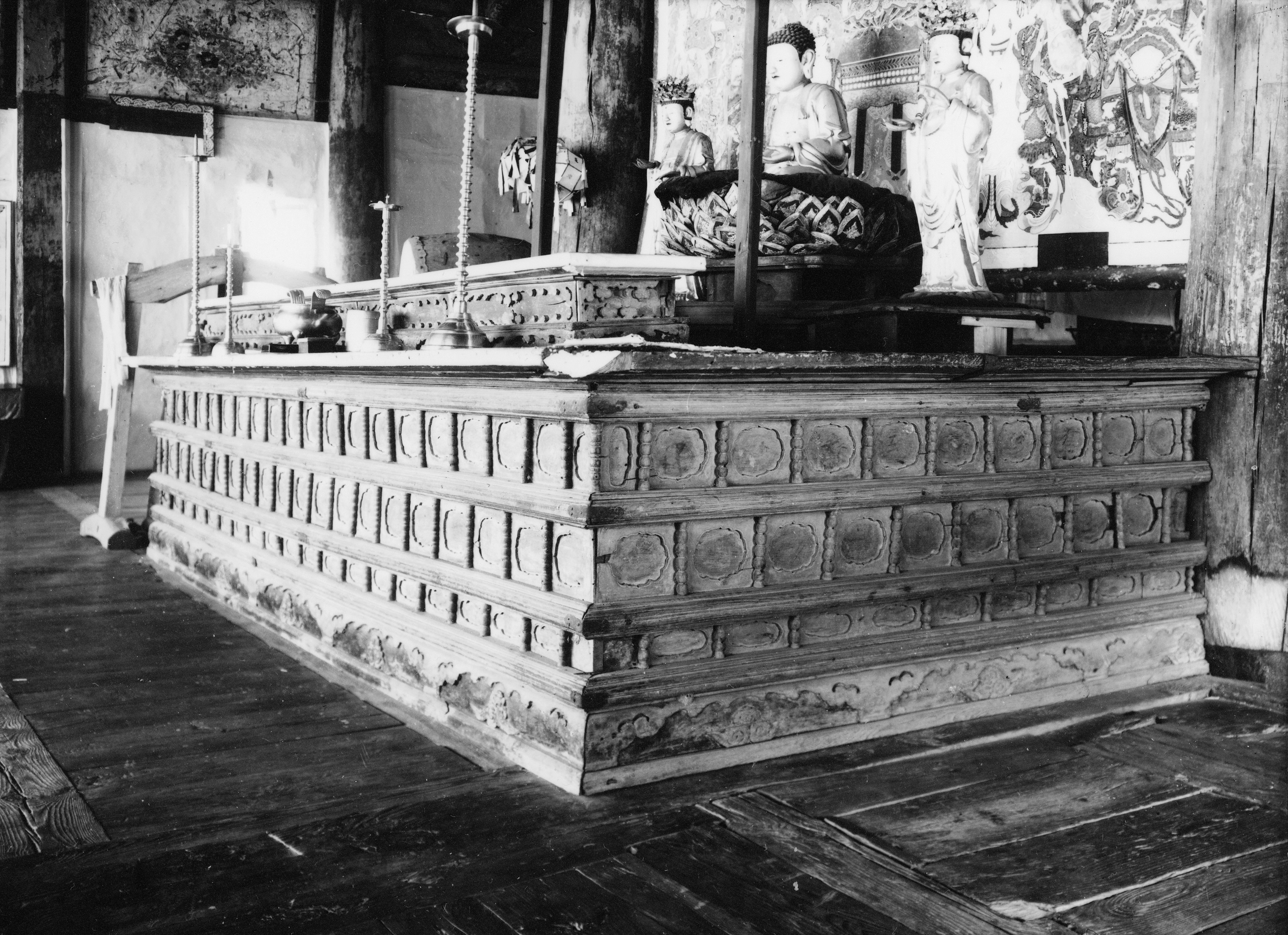
Another exhibit will feature a series of replicas of a mural in the main hall, which depicts a variety of flowers and plants including lotus, peonies, lilies, cockscomb, cattail, and arrowhead. The mural offers a glimpse of the gardening tradition of the preceding Goryeo period.
Particularly, cockscomb flowers evoke poems by Yi Gyu-bo (1168-1241), a famous man of letters and civil official of Goryeo.
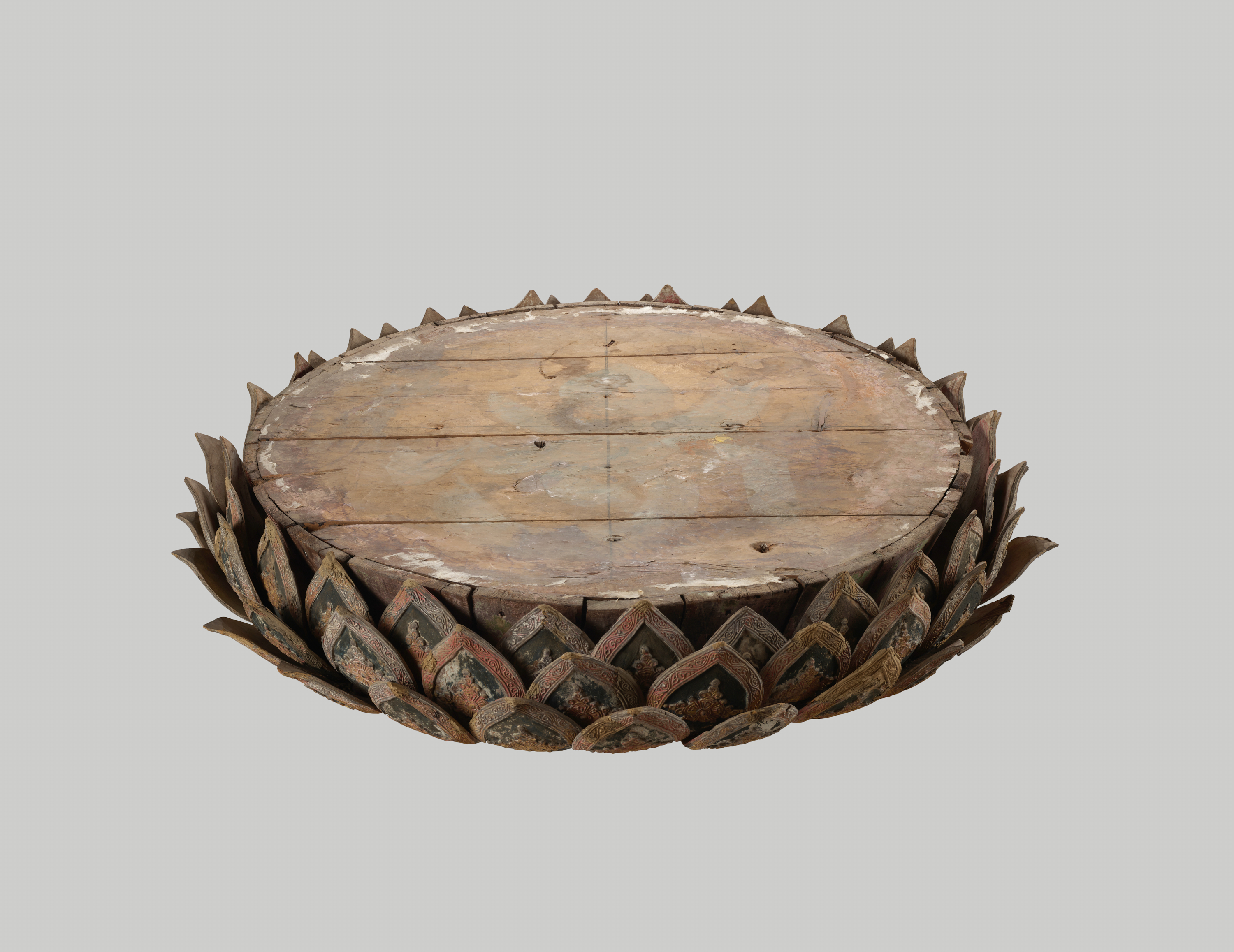
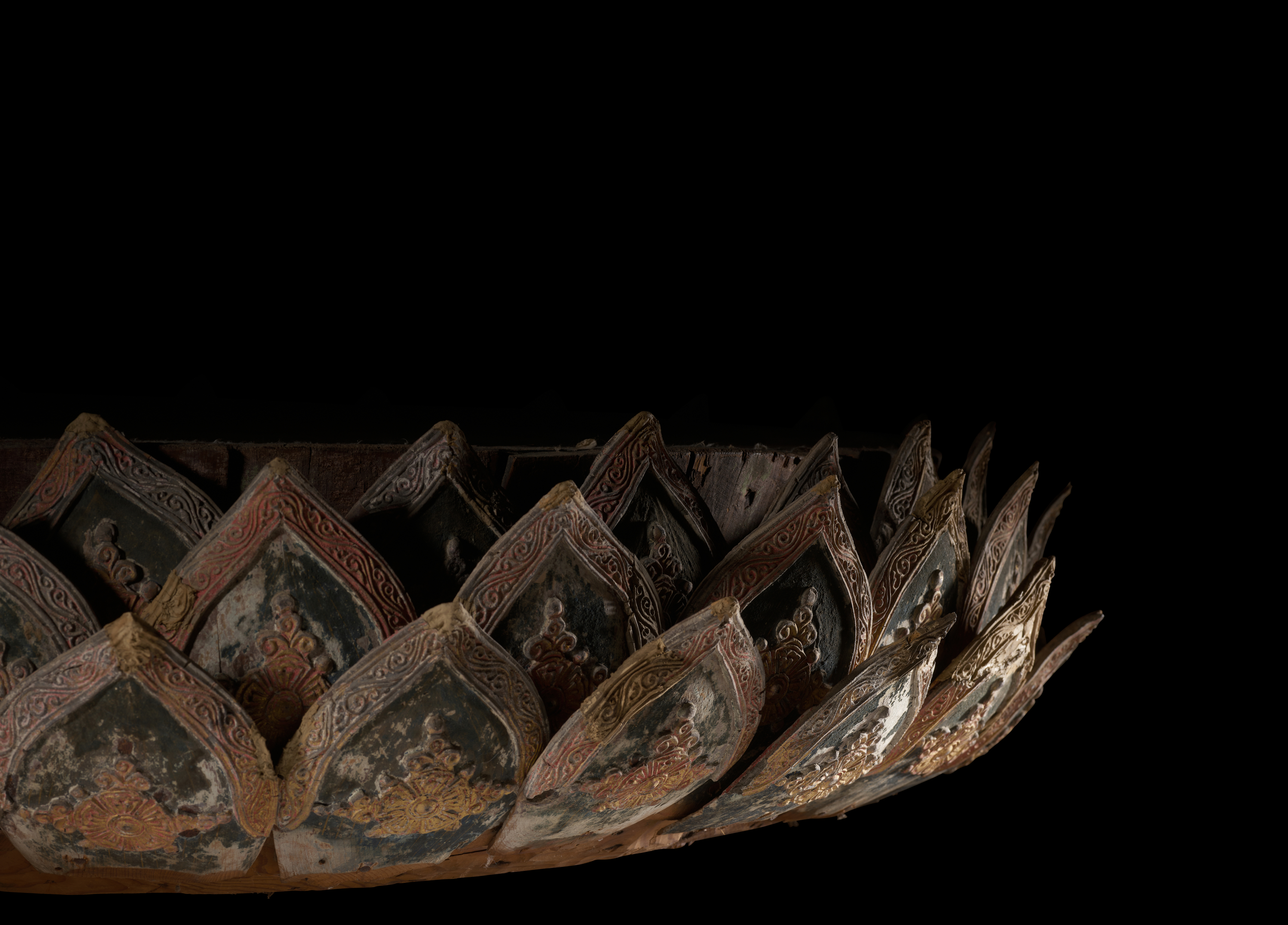
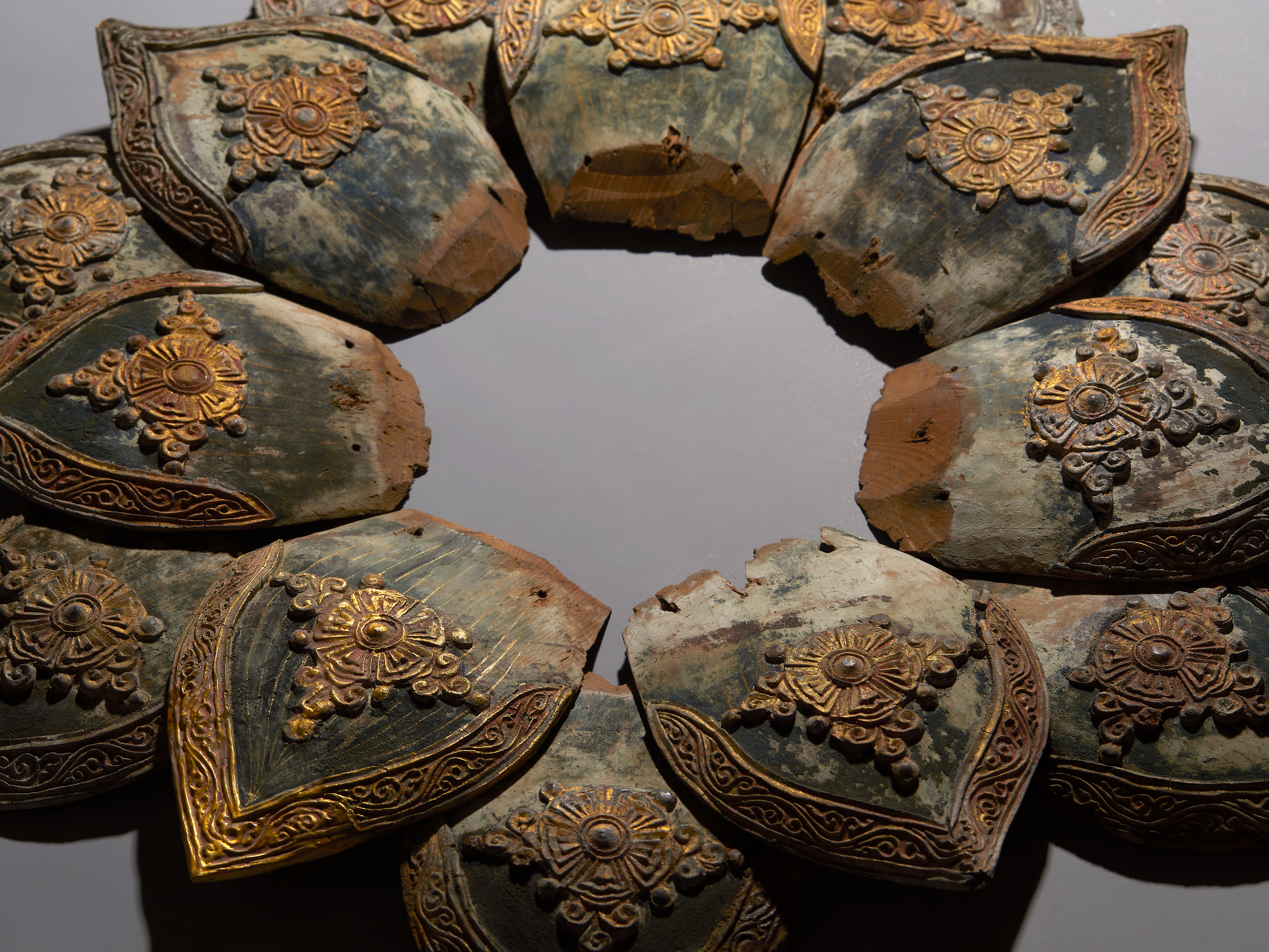
수덕사의 두 보물을 한 자리에서 만나다
괘불전 ‘빛의 향연-예산 수덕사 괘불’ 개최
ㅇ 기 간: 2022년 4월 13일(수)~2022년 10월 16일(일)
ㅇ 장 소: 국립중앙박물관 서화관 불교회화실(상설전시관 2층)
국립중앙박물관(관장 민병찬)은 2022년 부처님 오신 날을 기념하여 오는 4월 13일(수)부터 상설전시관 2층 불교회화실에서 보물 <예산 수덕사 괘불>을 전시한다. 이번 괘불전은 천년 고찰 수덕사의 고려시대와 조선시대의 귀중한 보물들을 함께 만나볼 수 있는 전시이다.
다채로운 빛의 향연, 보물 <예산 수덕사 괘불>
국립중앙박물관에 열일곱 번째로 방문한 <예산 수덕사 괘불>은 높이 10미터, 너비 7.4미터, 무게 150kg이 넘는 대형 괘불이다. 괘불을 보관하는 함까지 포함하면 380kg이 넘는다. 이번 전시를 위해 수덕사 스님들이 직접 법당 밖으로 괘불과 괘불함을 이운하여 서울 나들이를 도왔다.
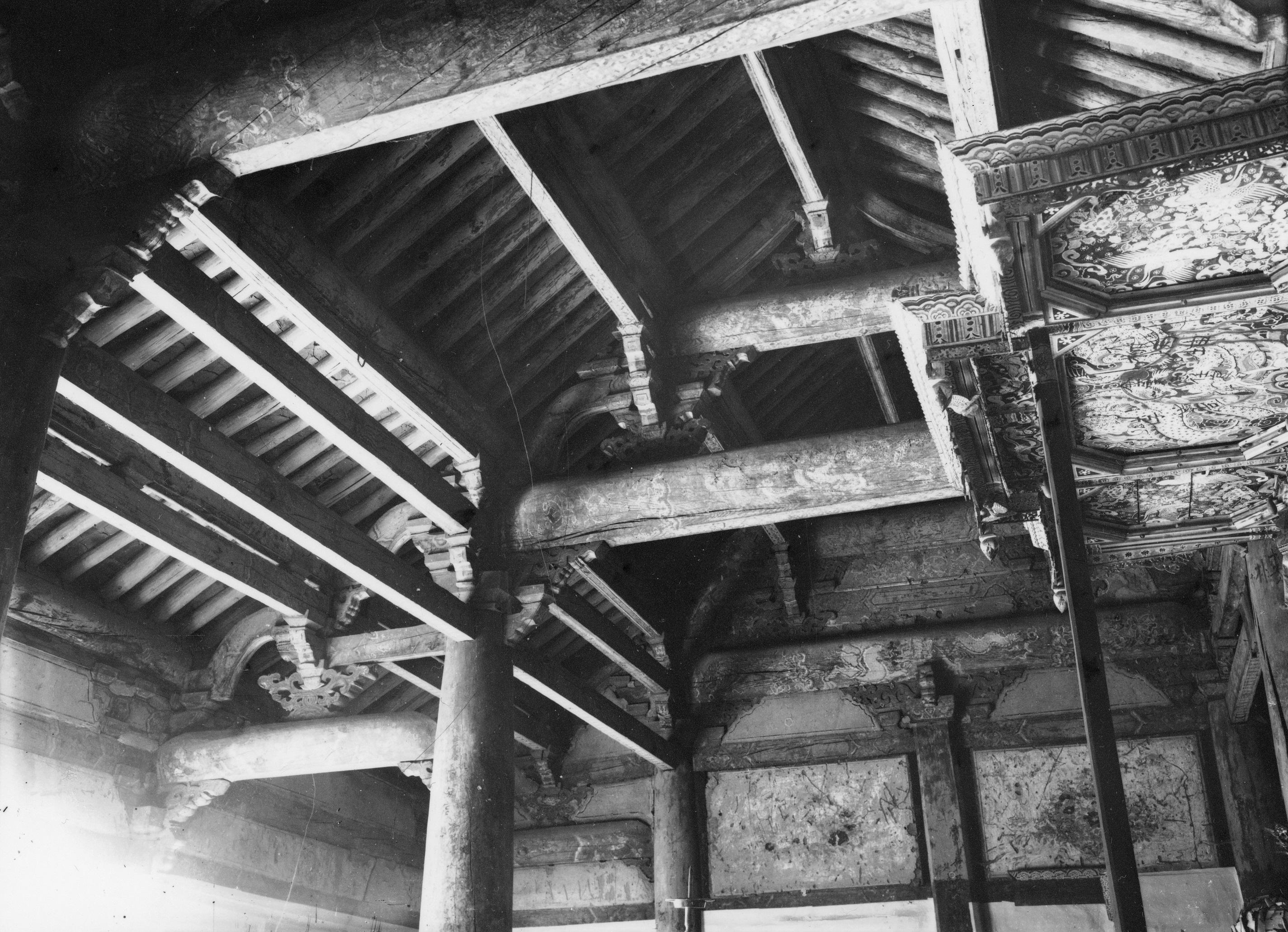
조선 1673년(현종14)에 조성된 이 괘불은 화면 가득하게 펼쳐진 빛이 돋보이는 괘불이다. 화면 중앙에는 오랜 수행으로 공덕을 쌓아 부처가 된 보신불인 노사나불(盧舍那佛)을 그렸다. 화려하게 장엄된 부처와 그를 중심으로 피어나는 신비로운 빛은 부처의 초월적인 힘을 보여준다. 담백한 수행과 정진만 있을 것 같은 조선의 불교문화에는 이처럼 화려한 형상과 거대한 크기로 사람을 압도하는 괘불이 있었다. 가르침을 전하는 부처뿐만 아니라 깨달음을 향해 정진하는 보살과 제자들, 수많은 신의 존재는 서양 신화에 등장하는 신들만큼이나 다채롭다. 도1-4
이 괘불은 응열(應悅)을 비롯해 그림을 그리는 화승(畫僧) 네 명이 조성했다. 괘불을 그린 수화승 응열은 9년 전인 1664년에도 <공주 신원사 괘불>을 조성한 화승이다. 괘불은 일반 불화를 그리는 것과는 규모 자체가 다르다. 그러므로 한 화승이 사찰의 초빙을 받아 괘불을 여러 점 조성했다는 것은 그의 명성과 영향력을 간접적으로 보여준다. 하단의 화기(畫記)에는 화승뿐만 아니라 불사(佛事)를 성공적으로 이끈 참여자 114명의 이름이 적혀 있다. 또한 수차례의 중수 기록은 이 괘불이 오랜 시간 많은 이에게 사랑받았음을 보여준다.도5
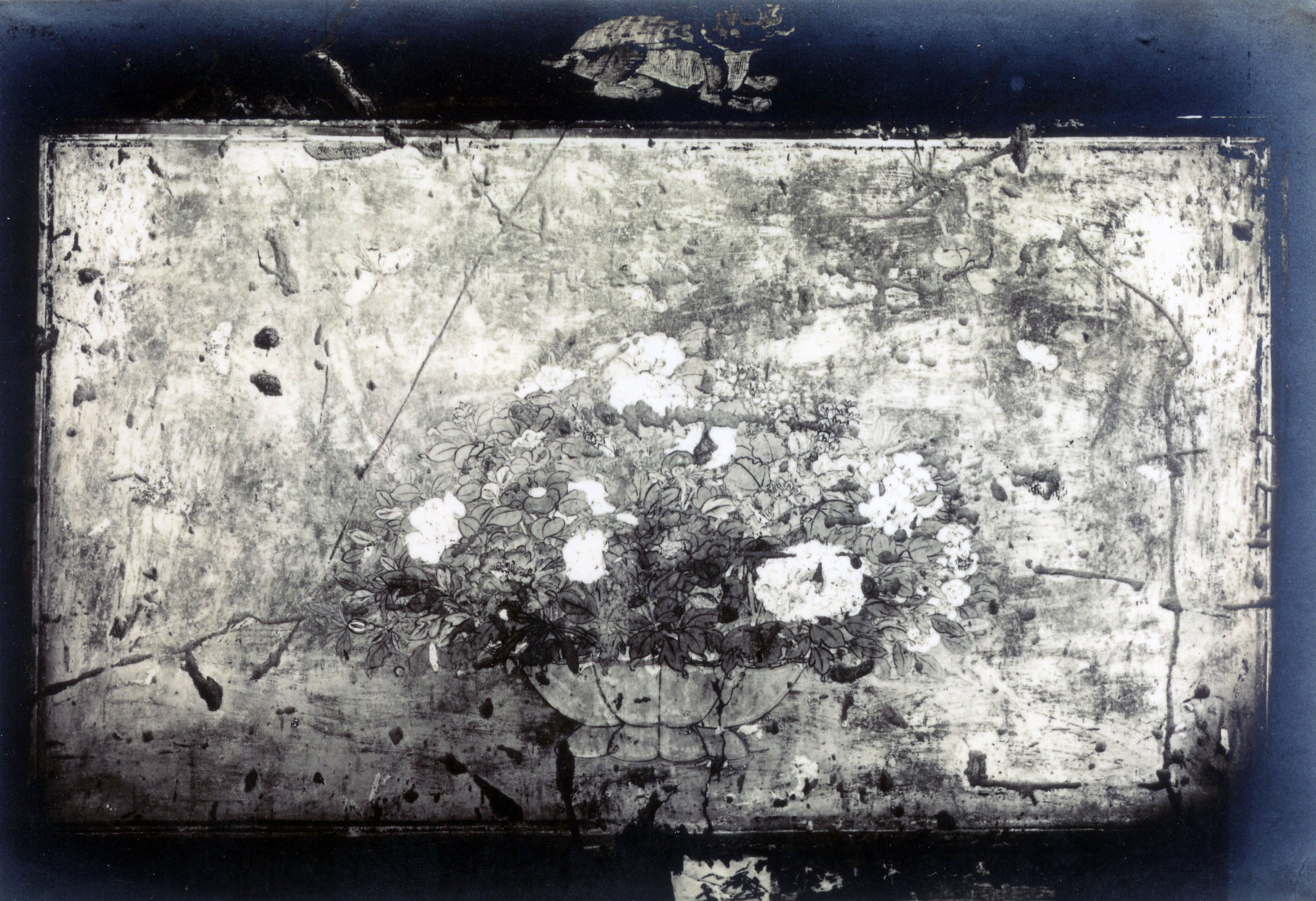

고려시대 목조대좌의 첫 서울 나들이
이번 괘불전에는 특별히 보물 <수덕사 대웅전 목조연화대좌>를 함께 선보인다. 고려 14세기에 조성된 이 연화대좌는 지금까지 확인된 유일한 고려시대 목조연화대좌로, 전시를 위해 처음으로 사찰 밖에 나왔다. 도6-9 이번 전시에는 과학적 조사 결과를 바탕으로 목조대좌의 내부 구조도 공개한다. 대좌 본체는 여러 나무판을 이어 붙여 만들었고, 연꽃잎을 따로 조각해 본체에 고정했다. 특히 연꽃잎을 꾸민 다양한 문양은 화려하고 장식적인 고려시대 목조대좌의 모습을 잘 보여준다. 고려 후기의 불화나 보살상에서도 이와 유사한 영락 표현을 살펴볼 수 있다.
이밖에 모란, 작약, 나리를 비롯해 연꽃, 부들, 벗풀 등이 그려진 <수덕사 대웅전 벽화 모사도> 전시한다. 모사도에는 고려시대 문인 이규보(李奎報, 1168~1241)의 시에서 여러 차례 언급되는 맨드라미(계관화鷄冠花)도 그려져 있다. 불전(佛殿)에 올리는 공양화를 그린 벽화로 고려의 원예전통과 고려인이 사랑한 꽃까지 만나볼 수 있다. 모사도 중 일부는 전시 기간 중에 교체된다. 도10-15
2022년 괘불전은 조선시대 불교미술의 압도적인 규모뿐만 아니라 고려 공예의 아름다움까지 만나볼 수 있는 특별한 기회이다. 시공간을 뛰어넘어 국립중앙박물관에 찾아온 수덕사의 두 성보문화재와 함께 불교미술의 아름다움에 빠져보는 시간을 가지길 바란다.
'NEWS & THESIS' 카테고리의 다른 글
| 화재 대참사 노트르담성당이 토해 낸 중세 납 뚜껑 (1) | 2022.04.18 |
|---|---|
| ‘그리운 만남, 새로운 만남’ 송광사 특별전 (1) | 2022.04.14 |
| 천박한 문화재인식을 드러낸 문화재청장과 국민소통수석은 즉각 사퇴하라????? (2) | 2022.04.09 |
| 실로 담대한 《설문해자주說文解字注》 완역 대장정 (8) | 2022.04.08 |
| 도쿄박물관에서 꿔다 전시하는 일본 불상 다섯분 (1) | 2022.04.04 |




댓글